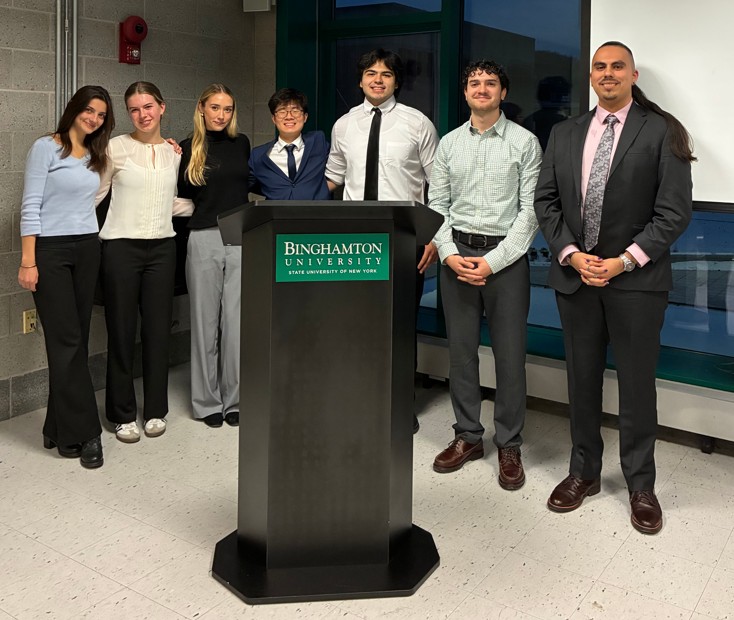
PELL Honors Program, Class of 2025
There are two separate methods for achieving departmental Honors. One can apply to work with a faculty advisor in coordination with a small group of like-minded Honors students under the direction of the Honors Director in the Pell Honors Program. Alternately, one can work individually with an advisor from among the Philosophy faculty.
The Pell Honors Program
The goal of the Pell Honors Program is to introduce undergraduate students to an intensive writing experience beyond the typical undergraduate education. Students write a peer- and jury-reviewed article that they then defend at a public conference and submit for publication. Students are exposed to graduate-level and professional standards of writing and speaking by developing their own philosophical writing in the context of working closely with faculty and the other participants in the program.
The program is named for alumnus Owen C. Pell, '80, whose vision and generous contributions help make it possible.
- Each year, the Philosophy Department offers a tutorial style workshop for between six and ten senior Philosophy and/or PPL majors who are writing honors theses. In the Fall semester, these students register for the four-credit PHIL 471: Pell Honors Seminar I or PPL 471: Pell Honors Seminar I. In the Spring semester, students who have earned Honors are eligible to register for one-credit PHIL 472: Pell Honors Seminar II or one credit PPL 472: Pell Honors Seminar II. This optional one-credit course is designed for Honors students to further revise their theses for publication.
- The Program is run by the Director, who is a member of the Philosophy faculty. Each student has an additional faculty member as an expert advisor. These advisors meet with the student several times over the semester to discuss the student's thesis.
- The Director solicits applications and makes selections for the program in the preceding spring. Applicants must have an overall GPA of at least 3.5.
- In the Fall semester, the Director leads a workshop that normally meets weekly and provides a forum for instruction regarding the process of writing the thesis, and for feedback on the students' work.
- At the end of the Fall semester, a public conference is held at which the students present their theses to a panel that is typically composed of Philosophy faculty.
- After the conference, the Director, in consultation with the conference panel, determines which Philosophy students will receive the Dillon Award and which PPL student will receive the Pell Award. Both awards are based on students' written work and their conference presentation.
- In the Spring, the workshop meets less regularly, and is devoted to revising the theses in light of the discussions at the conference and to polishing the theses for submission to conferences and/or for publication.
- Throughout the year, the Director may organize additional social and academic activities that further enhance the participants' experience and development.
- At the end of the Spring semester, the Director determines what level of Honors each student has earned based on their work in the Program.
In previous years, students from the Pell Honors Program have been admitted to some of the top law schools, Philosophy Ph.D. programs, and other graduate programs in the country.
- The law schools include: Harvard Law School, NYU Law School, William and Mary Law School (with a nearly full scholarship), and the UCLA Law School (with a nearly full scholarship); University of Connecticut Law School (with scholarship); Quinnipiac University Law School (with full scholarship); Hofstra University Law School (with full scholarship); University of Maryland Law School; American University Law School; and SUNY Buffalo Law School (with scholarship).
- Philosophy Ph.D. programs include: University of Pittsburgh (with full funding); University of Wisconsin, Madison (with full funding); University of Texas, Austin; CUNY Graduate Center (with full funding); Michigan State University (with full funding); and St. Andrews-Stirling (one of the best in the United Kingdom). Other graduate programs include the Harvard Divinity School.
Independent Study with a Faculty Member for Philosophy Honors
An Honors Committee is then formed comprising this advisor and at least one other member of the faculty (normally two other members), chosen by the student and the advisor. The requirements for the Honors Program are the successful completion of an honors thesis including an oral examination on the thesis conducted by the student's Honors Committee.
Students writing an honors thesis register for PHIL 498 and/or 499 (Honors Thesis) for a minimum of four and maximum of eight credits. The Honors Committee will make a recommendation to the Undergraduate Director for level of honors. A student whose thesis is judged to be of honors quality will receive special recognition at graduation. Otherwise, the student will receive course credit for an Independent Study.